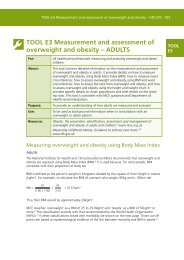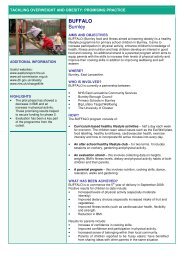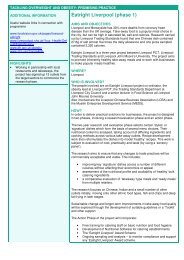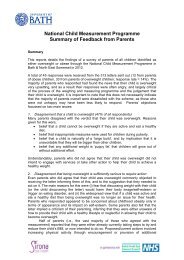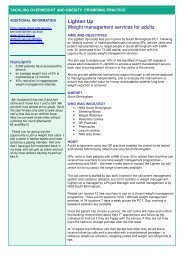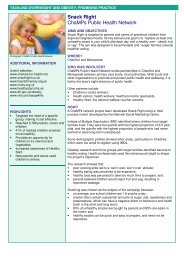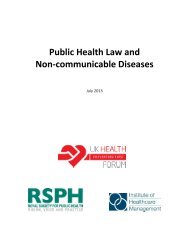The Challenge of Non-Communicable Diseases and Road Traffic ...
The Challenge of Non-Communicable Diseases and Road Traffic ...
The Challenge of Non-Communicable Diseases and Road Traffic ...
Create successful ePaper yourself
Turn your PDF publications into a flip-book with our unique Google optimized e-Paper software.
66 <strong>The</strong> <strong>Challenge</strong> <strong>of</strong> <strong>Non</strong>-communicable <strong>Diseases</strong> <strong>and</strong> <strong>Road</strong> <strong>Traffic</strong> Injuries in Sub-Saharan Africa<br />
unreliable or limited internet connectivity. A positive<br />
sign is that although few African countries have<br />
national policies or governance relating to e-health<br />
or telemedicine, a growing number have institutions<br />
involved in telemedicine development. <strong>The</strong>re<br />
is already, for example, a well-established collaboration<br />
between high- <strong>and</strong> low-income countries in<br />
the RAFT Project (Réseau en Afrique Francophone<br />
pour la Télémédicine) coordinated by the Geneva<br />
University Hospital, Switzerl<strong>and</strong>, <strong>and</strong> university<br />
hospitals in 18 largely francophone countries in Africa,<br />
which focuses on telemedicine <strong>and</strong> distance<br />
education <strong>of</strong> health care pr<strong>of</strong>essionals working in<br />
remote sites [465].<br />
5.6. Addressing Information <strong>and</strong><br />
Research Gaps<br />
Information<br />
Health information is needed for assessing health<br />
needs, developing evidence-based policy-making,<br />
performance management, <strong>and</strong> monitoring <strong>and</strong><br />
evaluating interventions [39]. Countries with the<br />
greatest health challenges also tend to have weak information<br />
systems [466]. On top <strong>of</strong> this, monitoring<br />
<strong>and</strong> reporting requirements related to grants, global<br />
declarations, <strong>and</strong> health <strong>and</strong> disease programs can<br />
add considerable burdens – a potential risk that<br />
NCD efforts need to avoid.<br />
Several countries (for example, Botswana, Namibia)<br />
are making significant efforts in integrating<br />
their multiple, disparate, disease-focused, st<strong>and</strong>alone<br />
health information systems. In Botswana, the MOH<br />
completed the Health Information Management System<br />
Strategic Plan in April 2012, that provides an ICT<br />
road map in line with the MOH-adopted e-health<br />
strategy, to integrate the current st<strong>and</strong>alone systems<br />
into the existing Integrated Patient Management System<br />
(IPMS). IPMS is a centralized, electronic medical<br />
record system focused on patient care <strong>and</strong> treatment<br />
in clinic, <strong>and</strong> hospital settings. It stores data on various<br />
health services, including ART, prevention <strong>of</strong><br />
mother-to child transmission, laboratory, <strong>and</strong> pharmacy,<br />
<strong>and</strong> in the near future will support the clinical<br />
case-management <strong>of</strong> Safe Male Circumcision <strong>and</strong> the<br />
National Cervical Cancer Prevention Programs. It is<br />
being implemented in 11 hospitals covering close to<br />
75 percent <strong>of</strong> total MOH hospital beds, their labs, <strong>and</strong><br />
satellite clinics <strong>and</strong> have plans to exp<strong>and</strong> to at least<br />
30 hospitals across Botswana. In Namibia, the Ministry<br />
<strong>of</strong> Health <strong>and</strong> Social Services is in the process<br />
<strong>of</strong> integrating 61 disease-oriented, donor-supported,<br />
st<strong>and</strong>alone applications into a single Web-based,<br />
Web-enabled platform. <strong>The</strong> Integrated Health Care<br />
Information Management System is a patient-centered<br />
record management system, that is HL7 9 compliant,<br />
which covers all aspects <strong>of</strong> hospital clinical<br />
case management <strong>and</strong> ancillary services in day to<br />
day operations. <strong>The</strong> system is being pilot tested in the<br />
Windhoek Central Hospital <strong>and</strong> it is expected to be<br />
operational in the other three largest hospitals in the<br />
country by the end <strong>of</strong> 2013, including the Katutura<br />
Hospital, which operates as the national trauma referral<br />
center. It is expected that once full connectivity is<br />
in place, the system will allow the sharing <strong>of</strong> complete<br />
patient records across Namibian health institutions.<br />
In the implementation <strong>of</strong> electronic health records<br />
(EHR) <strong>and</strong> ICT platforms, important challenges<br />
need to be addressed in order to overcome, in addition<br />
to existing technological barriers (such as<br />
lack <strong>of</strong> uninterrupted power supply, connectivity,<br />
<strong>and</strong> b<strong>and</strong>width): (a) the transitioning <strong>of</strong> hybrid approaches<br />
where traditional paper-based processes<br />
are maintained in parallel in direct competition<br />
with the EHR <strong>and</strong> supporting ICT platform; (b)<br />
the adoption <strong>of</strong> common health <strong>and</strong> information<br />
exchange st<strong>and</strong>ards (for example, ICD-10; HL7);<br />
(c) change-management strategies aiming to implement<br />
organizational change processes deemed<br />
critical in the delivery <strong>of</strong> health services, incorporating<br />
the clinical workflows <strong>and</strong> decision-making<br />
processes supported by the new technology; <strong>and</strong> (d)<br />
the required, qualified IT operational <strong>and</strong> maintenance<br />
support <strong>and</strong> financial backing needed for the<br />
sustainability <strong>of</strong> the systems.<br />
Limited civil registration <strong>and</strong> unreliable vital<br />
statistics relating to fertility, mortality <strong>and</strong> causes<br />
<strong>of</strong> death in Africa are recognized problems: for example,<br />
only four African countries report cause <strong>of</strong><br />
9 HL7 st<strong>and</strong>ards provide a framework for the integration, sharing,<br />
<strong>and</strong> retrieval <strong>of</strong> electronic health information. <strong>The</strong>se st<strong>and</strong>ards<br />
define how information is packaged <strong>and</strong> communicated from one<br />
party to another, setting the language, structure, <strong>and</strong> data types<br />
required for seamless integration between systems.




